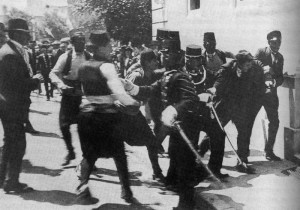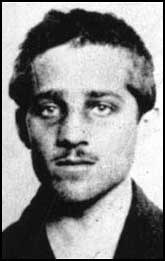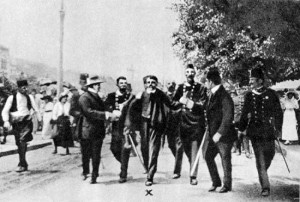Image: Princip’s Conscience February 2, 2012
Author: Beach Combing | in : Contemporary , trackbackBeach has several things on his conscience. Aged eight he clumsily trod on a frog breaking its back bone; last summer he accidentally killed a baby adder while trying to get it out of the garden; and then there was a very painful split with a girl who deserved better a decade ago, sorry E.
But what would it be like to have the death of people on your conscience? It is a burden that many carry with them hour by hour, day by day. Beachcombing once had a capable, serious student who ‘confessed’ that he had been responsible for the death of three passengers in a car and that he had left another passenger, a woman, in life-long paralysis in a hospital bed. Beach cried a little when he killed his juvenile adder: God knows what he would do with something like this haunting him.
But this is, of course, all little league baseball. Let’s get on to a real star who went to bed at night knowing that he was responsible for millions of deaths, millions of amputations and who stood behind the nightmare that men and women were still having as late as the 1990s. Beach refers, of course, to a mass murderer, who makes Hitler look like an ugly sister in a London pantomime: Gavrilo Princip.
The extraordinary thing is that many people don’t even know who GP was: though anyone who has read a book, knows his victim. Well, here is a clarification of sorts. GP was the Serbian patriot who 28 June 1914 shot, in Sarajevo, the Archduke Ferdinand and his delectable wife: Beach always grieves more for Sophie – perhaps because her last act was to throw herself on her husband, or perhaps just for fond memories of Sophie’s Stuttgart.
The events of that day are well worth the bizarrist’s study in their own right. After all, six assassins (!) failed to kill Ferdinand. It was only when the Archduke’s chauffeur took a wrong turn and blundered into the street where GP was despondently walking (with a pistol in his pocket) that the foundations of Europe started shaking.
Princip was nineteen when he set off the most disastrous conflagration in history. If he had been a month older, he would have been eligible for the death penalty and would have been spared the God awful mess he had made. But as it was he was sentenced to twenty years in prison and given a spectator’s seat as the world collectively checked into a mental asylum next door with sharp razors and loaded revolvers hidden away in their strait jackets.
We should say GP’s seat was in the stalls rather than on a balcony. For GP had a pretty miserable time in his cell in what is today the Czech Republic. He contracted TB and had an arm amputated and died in early 1918, just six months before the formerly great powers signed their armistice. One vivid detail not found in Beach’s written source, but there on several web sites (‘so it must be true’) is that he weighed 40 kilos at death. It sounds as if the Austro-Hungarians had decided to execute Princip slowly…
Of course, to call Princip a mass-murderer like Hitler is, in one sense, profoundly unfair. GP should bear moral responsibility for the deaths of two of Europe’s best royals and, on the plus side, he has part responsibility for the subsequent freedom of Serbia.
But GP is unquestionably at the apex of amoral cause and effect that led to the deaths of tens of millions of combat and civilian deaths in the First World War. That cannot be said of any one individual in the Second World War: not even the moustached Bavarian wolf in his killing lair.
In some way Beach feels towards GP as he feels towards Judas in the gospel accounts: he can’t help thinking that both were ultimately victims.
The photograph at the head of this post and the one above of GP being led away then is well worth a minute of meditation. Here we see the seconds immediately after Europe began its plunge into lunacy. In the first photograph Princip, second from right, is being arrested in a scuffle – memory of an earlier arrest post on this blog – and the blood of Sophie and Ferdinand are running through the streets of Sarajevo.
Sometimes in history – if we took on the guise of a time-lord – we could step back and prevent disaster: jog a shooting arm, stuff five dollars into the hand of a starving man or woman, push a pram carrying a particularly obnoxious future ruler into a nearby river. But no such luck here. By the time these photographs were taken it was already (moments) too late.
Beach is always fascinated by hinge moments: drbeachcombing AT yahoo DOT com
***
3 Feb 2012: First up is Ricardo R. who has an objection shared by many readers, his email will hopefully serve for all: I can’t help think that WWI was just something awaiting to happen and to ascertain any kind of blame to the man who puts the last drop in the glass a bit unfair. In a loose link I’m reminded of the infamous “football war” between El Salvador and Honduras (which sprung to my mind yesterday while getting news on the deaths in Egipt, after a football match). Some occasions just work like photographic chemicals, bringing whatever is hidden to the surface and making it visible.’ Beach would agree with all of this. WW1 was going to happen given France and Germany’s attitude to Strasbourg and their recent shared history. But what interested Beach here was the poor dolt who put himself at the apex of ‘cause and effect’. Just because it was going to happen anyway doesn’t make photographs taken moments after any less chilling. Or does it? Then comes RR: ‘These ‘hinge moments’ you mention can only be seen in history’s rear-view mirror, imo. If only the nexus of crucial human events could be foreseen. On the other hand, that might not be such a blessing. Que sera, sera. Your essay’s last paragraph made me think immediately of the short story, The Adjustment Bureau, by Phillip K. Dick. It is absolutely on point with your wish. The film of that work with Matt Damon is very much worth viewing. If you have not seen it, the entire film is about hinge moments for an individual, Damon, and how/why those moments occur. My distaste for most of Hollywood’s offerings is immense, but this movie overcame it. For a short while. 90 minutes, perhaps.’ Then Adrian Sterling of Anomalist fame writes in: ‘If you’re interested in hingepoints of history, check out a little card game by Looney Labs called Chrononautshttp://store.looneylabs.com/Chrononauts. You have a timeline (it’s a touch provincial, sad to say) going from the Lincoln Assassination up to the David Koresh/Waco disaster. Among these is the assassination of Archduke Ferdinand. There are three ways to win. Collect 3 artifacts on your mission, make the timeline fit your home timeline or have 10 cards in your hand at the end of your turn. You get your timeline by flipping over history cards, creating paradoxes then patching them up. For example Archduke Ferdinand was just wounded instead of killed which changes other points of the timeline. Not to mention the superparadox where nuclear war happens in 1963 meaning the timeline beyond that is completely unchangeable. If you’re playing a cockroach or space alien chrononaut you usually want that to happen. It’s a cool history game and a nice way to get kids interested in history.’ Thanks Ricardo, RR and Adrian!
5 Feb 2012: Mikulpepper is shouting cobblers and he may be justified. ‘That picture got me going on a sort of stream-of-consciousness googlefest (stream-of-search?). Anyway, some folks doubt that the photo actually shows Princip’s arrest. One site goes so far as to identify the arrestee as one Ferdinand Ber, a friend of Princip’s. But that site loses because it cites Princip’s Sandwich, an apparent urban legend that is dissected here. That mythic sandwich is now the subject of art and a sign that, perhaps coincident with the passing of anyone who can remember this event, it has become Legend. Princip’s Remorse? Probably non-existent in fact, but a worthy subject for Myth.’ Thanks Mikulpepper!
12 Feb 2012: Invisible writes in with this link to the unlucky car. Thanks Invisible!
30/April/2012: Adrian Sterling of Anomalist fame writes: Back in February you mused upon the fate of Gavrilo Princip. Today I saw this article. “Curveball” was asked if his lies started a war that killed many, he simply answered “yes”. Anyway I saw a weird correspondence there. It’s unfortunate that “Curveball” avoided a similar fate as Gavrilo.’ Thanks Adrian!





